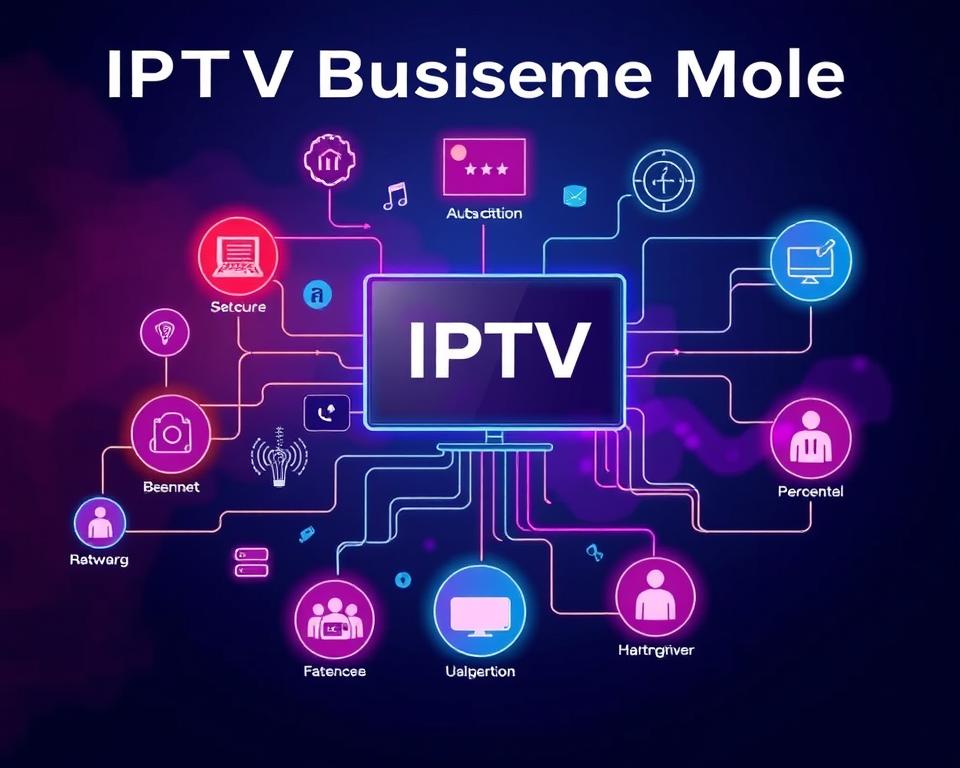Starting an IPTV Business in USA: A Guide
The IPTV business is predicted to hit USD 145.21 billion by 2026. Around 100 million people watch video content every day. This shows a big chance for business-minded folks to step into Internet Protocol Television. As more people say goodbye to traditional cable, starting an IPTV in the USA is not only profitable. It’s also a way to offer viewers flexible, quality options.
This detailed IPTV startup guide will teach you the key points to understand this growing field. You’ll find out what technical and legal steps are needed for success. Plus, discover how to market your service well. With these insights, you’re set to create an IPTV service that stands out. This makes sure users keep coming back for more.
Want to dive deeper? Here’s a thorough guide on starting your IPTV subscription service. With entertainment changing fast, now is the time to jump on this opportunity. Make your mark in the entertainment world today!
Key Takeaways
- The IPTV market is expected to see significant growth in the coming years.
- Understanding market analysis is essential for targeting the right audience.
- Technical requirements and content acquisition strategies are crucial for success.
- Innovative marketing tactics can greatly enhance subscriber acquisition.
- Diverse revenue models can maximize profitability.
Introduction to IPTV and Its Benefits
IPTV, or Internet Protocol Television, changes how we watch TV by streaming content over the internet. This new way of watching shows brings lots of benefits over old cable services. Now, viewers value being able to access shows anytime more than owning them.
One top benefit of IPTV is that it lets you watch on many devices. This includes smart TVs, computers, and phones. You can also hook up more than one TV to the same IPTV subscription. This makes it a budget-friendly option for families.
Customizing what you watch is another great thing about IPTV. People can pick channel packages that fit what they like to watch the most, making it a better watching experience. Also, IPTV offers a huge selection of shows on-demand, not just live TV. This sets it apart from platforms that only have on-demand shows, like Netflix. Services like IPTV Subscription USA show the difference technology makes in entertainment.

IPTV works on a special network, letting viewers stream live shows and use features like video on demand. With many IPTV providers in the USA, such as AT&T and Hulu, there are options for everyone.
Understanding the IPTV Business Model
The IPTV business is growing fast in the entertainment world. By 2026, it’s expected to be worth over $194 billion. A good IPTV business plan should focus on keeping users happy, delivering content well, and handling payments smoothly. Doing this well means your customers will enjoy your service and stick around.
Customers can choose from different IPTV services based on what they like:
- Video on Demand (VOD): Users can pick from many movies and shows to watch whenever they want, which gives them lots of options.
- Live Broadcast: This lets users stream live events and channels as they happen, offering an exciting watch experience.
- Ad-Supported Content: This option gives users access to free content but includes ads, making it great for those looking to save money.
Being successful in IPTV takes hard work, deep research, and picking the right business model. You must get the needed licenses, offer a wide variety of content, and promote your services well. As more people choose OTT services and move away from traditional TV, offering high-quality services will help you earn more from IPTV.

How to Start IPTV Business in USA
Starting your IPTV journey involves several critical steps. You aim to build an IPTV company that stands out. Knowing your market and audience is key for a strong start.
Step 1: Conduct Market Analysis
The first step is doing a deep dive into the market. This helps you grasp the current scene and lets you:
- Identify competitors and their offerings.
- Explore potential gaps in service delivery.
- Assess viewer preferences and viewing habits.
- Recognize demand for niche content that can set your service apart.
This information guides you to tailor your business efforts. It makes sure your service hits the mark with audiences and catches current trends.
Step 2: Identify Your Target Audience
With market knowledge in hand, pinpointing your audience is next. Your viewers could range from sports fans to families wanting educational shows. Knowing your audience means:
- Personalized content offerings that attract and retain viewers.
- Effective marketing strategies tailored to specific segments.
Your aim is to craft a content library that speaks to your audience. This boosts customer happiness and loyalty in this fast-paced market.
Essential Infrastructure and Technology for IPTV
To launch a successful IPTV service, you need a strong base of IPTV infrastructure and tech knowledge. Every part, from readying content to picking streaming protocols, should fit well into your business plan. This ensures your IPTV service works really well.
Content Preparation and Licensing
Getting your content starts with obtaining the right to broadcast it. This means working closely with content providers. You’ll make sure your IPTV service is legal and can grow. Knowing the laws about licensing is key to avoid problems later and to be a trusted service.
Selection of Streaming Protocols
Choosing the right streaming protocols is crucial for a smooth viewer experience. Important protocols include:
- HTTP Live Streaming (HLS) for adaptive bitrate streaming.
- Dynamic Adaptive Streaming over HTTP (DASH) for a better viewing experience.
These protocols help deliver top-notch video quality and quick response times, meeting viewers’ expectations today. As more people want on-demand content, using the latest tech is vital. Solutions from providers like Vodlix are key for meeting IPTV technology requirements
| Protocol | Advantages | Use Cases |
|---|---|---|
| HLS | Adaptive bitrate streaming, broad compatibility | Live TV, sports events |
| DASH | Dynamic streaming, high efficiency | On-demand video services, interactive media |
By focusing on these areas, you create the necessary infrastructure for IPTV success. Staying updated with tech developments makes your service known for quality and dependability.
Content Acquisition Strategies
Getting content is key to a booming IPTV business. Working out how to get IPTV licenses and choosing between making new content or using what’s already out there is crucial. With the IPTV world growing fast, thanks to more people having internet and better streaming tech, it’s important to get your content strategy right.
Negotiating with Content Providers
Building strong bonds with content providers is a must. You need to look at what they offer, know how their licenses work, and suggest deals that work well for both of you. Think about using ready-to-go solutions that let you start fast and save money. These solutions often come with the tech and know-how you need without big upfront costs. Plus, teaming up with local partners through MwareTV can make getting content easier, improving what you have to offer.
Creating Original Content vs. Licensing Existing Content
Deciding if you should create your own content or use what’s already there depends on your business aims. Making your content can set you apart but it’s costly in terms of making and promoting it. This might not fit every new business. Yet, using existing content is a tested way to get good shows and meet legal rules. Getting licenses lets you offer a wide range of movies, TV, and live events, which keeps your service in the game and attractive to users.
Using both licensed and original content offers the best mix. This way, you draw in viewers and boost your brand with smart marketing moves, like teaming up on social media and using SEO. Success comes from eager negotiating and being ready to tweak your content plan to what the market and people want.
Setting Up Your IPTV Service in the USA
Starting your IPTV service in the USA requires understanding important tech needs. First, it’s best to use fiber broadband for the best speed and reliability. This choice is key for a great watching experience. It fits well with IPTV’s various features like Video on Demand and Live Broadcast.
Technical Requirements: Servers and Software
The tech needs for IPTV are complex but essential for top-notch service. High-performance dedicated servers are a must for handling streams well. This setup ensures smooth content delivery and fewer delays. Choosing the right IPTV middleware, like Setplex’s NORA system, is also crucial.
Choosing a Streaming Platform
Picking the right IPTV streaming platform requires considering features that improve user experience. Look for user authentication and content management tools. Services like Setplex offer custom interfaces to meet specific needs. Adding interactive features can make your service stand out. Research thoroughly to find technologies that meet both business and user needs.
Building a successful IPTV business requires diligence and adaptability in technology selection.
In conclusion, focusing on these IPTV tech requirements and carefully picking your streaming platform will help your business grow in the ever-changing entertainment market.
IPTV Business Plan Tips
Creating a strong business plan is key for your IPTV service success. It involves figuring out what makes your service special and looking at different ways to make money. This way, you can stand out from others.
Defining Your Value Proposition
It’s important to know what sets your IPTV apart in a full market. Knowing what worked or didn’t for others is crucial.Statistics show using insights from successful companies helps new services do well. By studying what viewers want, you can shape your service to be more engaging and attractive. Offering great original shows or exclusive content can keep viewers coming back for more.
Revenue Models: Subscription, Pay-Per-View, and Ad-Supported
Choosing the right revenue models is critical for long-term success. Here are three popular ones:
- Subscription-Based: This steady income model is good for users who like knowing their expenses.
- Pay-Per-View: This option allows for higher profits from special programs or events.
- Ad-Supported: Ads can attract more users while bringing in extra money, lifting subscriber happiness.
Smart pricing is a must, as it must fit what customers are willing to pay. Being competitive with prices is important for keeping and getting new users. Working with content creators can boost your IPTV service’s appeal and offer more variety. This can lead to happier subscribers.
Legal Considerations for Starting an IPTV Business
Starting an IPTV business means you must understand the laws involved. Knowing the legal requirements will protect your businessand help it grow.
Understanding Licensing and Regulatory Compliance
In the U.S., setting up an IPTV service means you need different licenses for using content. These licenses cover broadcasting, distributing, and copyrights, ensuring you’re following the law. To stream smoothly, fiber broadband is best. It’s smart to talk to legal professionals who know about IPTV rules. They can help you with the needed paperwork and permissions.
Getting the right licenses and permissions is key for launching your IPTV service successfully. You might need to deal with:
- Broadcasting rights for live TV.
- VOD rights for shows and movies.
- Following local and national laws.
Running an IPTV business takes a lot of work, especially when dealing with licenses. Good middleware like NORA is important too. It makes sure IPTV works well with different devices.
Teaming up with a reliable technology provider, like Setplex, could make things easier. Setplex offers great support and custom solutions for IPTV providers. Their IPTV/OTT media player gives your customers access to tons of videos, keeping everything legal.
Marketing Strategies for Your IPTV Service
In today’s tough market, having strong marketing for IPTV is key to grow and succeed. You need to clearly define your IPTV brand and build a strong online presence. This includes sharing what makes your brand special and different from others in the crowded IPTV world.
Create a website that’s easy for your customers to use. This will help them find what they need quickly.
Defining Your Brand and Online Presence
Your brand should mirror what your IPTV service stands for. Things like engaging content, creative features, and focusing on user experience can boost your marketing. A memorable brand identity draws more customers and keeps them coming back.
Also, make sure your website is easy to find online by improving its SEO. This attracts more viewers.
Utilizing Social Media and Digital Marketing
Platforms like Facebook, Twitter, and Instagram are crucial for promoting your IPTV and connecting with your audience. Use these platforms for ads that speak directly to your potential customers.
A diverse marketing strategy, along with using data to understand what viewers like, will drive growth. Keeping viewers engaged is vital for your IPTV’s success.







